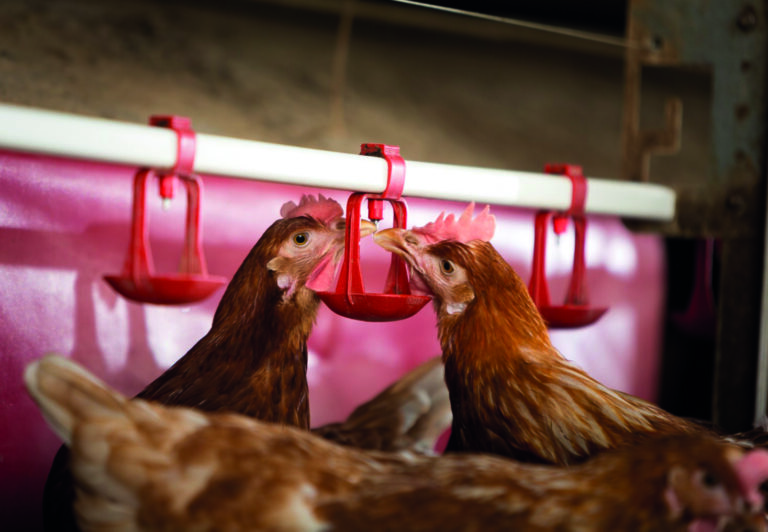Trouw’s Chloe Paine explains why now is the time to be focusing on feed nutrition
Ensuring high levels of gut health will be vital to help offset the staggering increase in feed costs that are hitting profits on all poultry units. That’s according to Chloe Paine, poultry technical manager at Trouw Nutrition GB. “The rising costs of fuel, feed and transport has created a dilemma for producers,” she explains.
“Protecting the pennies of profit could be the difference between surviving and thriving in the current market conditions, but how best to protect those pennies?
Implementing effective strategies focused on optimising feed efficiency will be an important management strategy.
“The adoption of innovative approaches will help producers minimise the impact of rising input costs, focusing on both the feed and the water provided to the bird with the aim of maximising the absorption of every nutrient fed to birds.
Target applications of additives that can improve utilisation of both feed and water can play a major role.”
Paine comments that it can appear counter intuitive to invest more into feed costs at a time where clawing back costs feels like the right thing to do. However, the return on investment on a per-egg basis is the figure to focus on to ensure that optimum potential is extracted from the laying flock, she stresses.
Maintaining high levels of gut health starts in the rearing flock. A young bird with a well-developed gut is less likely to suffer from the post-vaccination growth check commonly observed in pullets. A well-developed gut will help pullets maintain daily liveweight gain and put them in optimal pre-lay condition.
“Entering the laying period in the best-possible health and physiologically developed for stage and age, will set the flock up for effective and consistent egg output, allowing for a healthier return from production,” Paine continues. “It is not only body weight, but body composition at sexual maturity that is the important consideration.
“Pullet growers must manage flocks so that birds are in the optimum condition at point of lay. This can only be estimated by body weight, and gut health plays an important role in achieving this. Once in the laying phase, a healthy gut helps improve nutrient absorption and eggshell quality.”
Paine explains that gut health is not age dependent and recommends the use of supplements such as Selko pH and Presan to prevent bacterial intake, support digestion, strengthen gut barrier function and stabilise microbiota, which leads to improved gut health.
“It will also pay to modify feeding strategies, specifically considering split feeding, which is a feed strategy to closely meet the daily requirements of layers. Hens are fed two different diets per day to meet the differing requirements of the egg-formation process. A morning diet will be higher protein to support egg formation while the afternoon diet will be higher in calcium, vitamin D3 and trace elements to meet the hen’s requirements for eggshell formation.
“By more precisely matching requirements with supply of split feeding we can help reduce total intakes of energy, protein, calcium and phosphorus, improving sustainability by reducing excretions while reducing feed costs,” she adds.
Paine also stresses that water quality is crucial and says it is often described as the forgotten nutrient. In addition to hygiene, it is important to assess the pH and relative hardness of water.
Strategic use of in-feed and in-water additives can play a crucial role in helping to promote gut health. Trouw Nutrition has a range of feed and water solutions available to support and optimise flock production.
“For example, Selko pH E, when added to clean water lines, has a dual action of bactericidal and bacteriostatic effects. It acidifies the water, reducing how many environmental pathogens enter the animal through the drinking water. It also aids intestinal health by supporting microbial balance, aiding digestion and reducing the prevalence of pathogens that reach the hind gut. This is especially important for chicks where the intestinal tract is still developing and therefore can be influenced to set the bird up for optimised longevity in the flock, helping safeguard the hen’s profitability.”
Innovative tools and management practices are more important than ever in today’s challenging environment, Paine says. The combination of these elements will enable layers to be developed in a healthy, efficient and profitable way, resulting in greater egg production.


